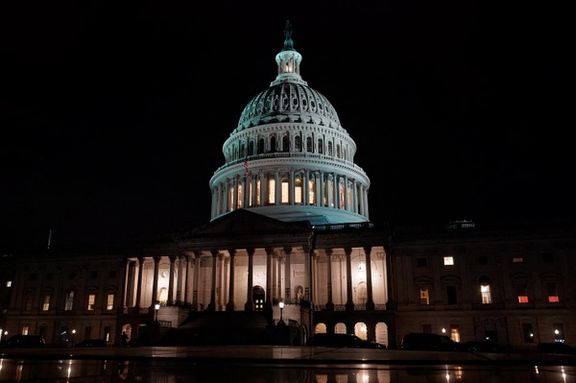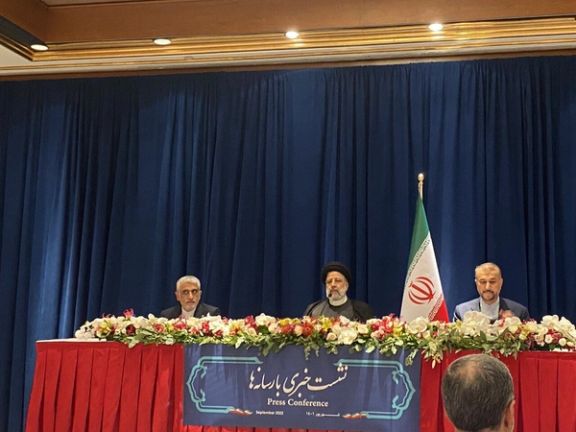Congress Seeks To Expedite Musk’s Satellite Internet For Iranians

A bipartisan group of US lawmakers has called on Treasury Secretary Janet Yellen to give Elon Musk’s satellite Internet service Starlink clearance to operate in Iran.

A bipartisan group of US lawmakers has called on Treasury Secretary Janet Yellen to give Elon Musk’s satellite Internet service Starlink clearance to operate in Iran.
In a letter to Yellen published on Thursday, the lawmakers wrote that the SpaceX CEO “recently stated that SpaceX would seek a license to provide its satellite based Starlink Internet service to Iran,” urging the Treasury Department to facilitate such an action.
The letter was led by Representatives Claudia Tenney, a New York Republican, and Tom Malinowski, a New Jersey Democrat, and signed by several other lawmakers in the House.
“Congress is calling on the Treasury Department to do everything in its power to help the Iranian people stay connected to the Internet,” Tenney said in a statement. “We need to cut through any bureaucratic red tape and get this done.”
They made the move in reaction to a tweet by Musk, who had asked for an exemption to be able to send the necessary equipment to the Islamic Republic.
The move was prompted after Iran has cut internet or slowed it down and filtered almost all platforms that protesters can use to make their voice heard, but the elephant in the room is how exactly Musk can send equipment legally to the country that opposes such technology and how people will be able to use it under the clenched control of the regime.
The US Treasury Department said a day earlier that satellite internet equipment are not under Washington’s sanctions and can be exported to Iran, suggesting that a license is not needed to provide the firm's Starlink satellite broadband service in the country.
The statement by the Treasury did not specify whether the license would apply to Musk's plans, so the lawmakers also asked Treasury to clarify its policies for fostering communications access in sanctioned countries and urge the department to issue any necessary “comfort letters” to entities that may seek to provide communications services under previously issued general licenses.

World leaders’ reactions to the ongoing protests in Iran over the death of a hijab victim are pouring in on the backdrop of President Ebrahim Raisi’s visit to the UN General Assembly.
World leaders’ reactions to the ongoing protests in Iran over the death of a hijab victim are pouring in on the backdrop of President Ebrahim Raisi’s visit to the UN General Assembly.
The Australian foreign ministry told Iran International’s correspondent that Canberra is deeply saddened by the death of Mahsa Amini, a 22-year-old Kurdish woman killed in hijab police custody, and also voiced concerns over the Islamic Republic’s crackdown on the popular protests for basic freedoms.
"Treatment of women in Iran continues to be a matter of grave concern and we regularly raise our concerns over Iran’s significant discrimination against women with officials in both Tehran and Canberra and in multilateral forums," a spokesperson said in response to Iran International.
On Thursday, the US Secretary of the Treasury Janet L. Yellen described the death of Mahsa Amini as “yet another act of brutality by the Iranian regime’s security forces against its own people,” after announcing sanctions against Iran’s Morality Police and some security officials.
The remarks came a day after President Joe Biden said in his address to the UN General Assembly that “Today we stand with the brave citizens and women in Iran who right now are demonstrating to secure their basic rights.”
US National Security Advisor Jake Sullivan also said on Thursday that "Today, the United States is sanctioning Iran’s so-called 'Morality' Police responsible for the death of Mahsa Amini. We will continue to hold Iranian officials accountable and support Iranians’ ability to protest freely."

US Secretary of State Antony Blinken also touched upon the new measures, saying that Washington “sanctioned the entity responsible for the arrest and death of Mahsa and designated seven other Iranian security officials responsible for suppressing non-violent protests.” He had earlier called on the Iranian government to end its systemic persecution of women and to allow peaceful protest.
Earlier in the day, White House National Security Council Coordinator John Kirby told our correspondent that "President Biden was very clear about our desire to see peaceful protests. We're going to continue to stand up for civil and human rights."
Senior US Democratic Senator from Vermont Patrick Leahy said, “We should all stand with brave women of Iran and their supporters protesting the human rights abuses of the Iranian government and demanding basic rights for women.” “Their courage gives me hope for a brighter future in Iran.”
Also on Thursday, German Foreign Minister Annalena Baerbock denounced "the brutal attack against the courageous women" who have been demonstrating in Iran, calling the crackdown on the ongoing protests "an attack on humanity,” adding that Berlin will ask the UN High Commissioner for Human Rights to deal with the crackdown as a violation of human rights.

Voicing solidarity with the Iranians’ protests, Swedish Foreign Minister Ann Linde said, “Sweden stands with all those who mourn Mahsa Amini in Iran and elsewhere.” He also expressed deep concerns about reports of injured and dead in connection with ongoing protests. “Women of Iran should be heard. Human rights for all Iranians, including the right to peaceful protest, must be ensured.”
In his speech at the General Assembly, Chile's President Gabriel Boric also condemned the death in detention of Amini by Iranian police, saying that the international community must "mobilize efforts to stop violence against women whether it be in Iran, in memory of Mahsa Amini, who died at the hands of the police this week, or anywhere in the world".
Unlike President Raisi who ignored Amini’s death and the current protests in his country during his address, Israeli Prime Minister said, “Iran’s regime hates Jews, hates women, hates gay people, hates the West. They hate and kill Muslims who think differently, like Salman Rushdie and Mahsa Amini.” “Their hate is a way of life. It is a way to preserve their oppressive rule,” he added.
The Oslo-based NGO Iran Human Rights said on Thursday that the death toll of the protests across Iran has risen to 31. Iran's state broadcaster earlier confirmed the deaths of 17 people, including security forces and protesters, but the real number is expected to be higher.

President Ebrahim Raisi held a press a conference in New York on Thursday, warning protesters on streets across Iran that "acts of chaos" are not acceptable.
Speaking at a news conference on the sidelines of the United Nations General Assembly, claimed that he had ordered an investigation into the case of Mahsa Amini, 22, who died last week due to severe head trauma after being arrested for wearing “improper hijab."
However, authorities have not arrested any police official or provided any details about the progress investigation.
"There is freedom of expression in Iran ... but acts of chaos, riots and vandalism are unacceptable,” Raisi said referring to protesters who have taken to the streets across the country to vent their fury over Mahsa’s death, the biggest protests in the Islamic Republic since 2019.
According to information obtained by Iran International, Raisi's team told US media managers that they are free to ask anything about the status of the talks to revive the nuclear deal but no question on Iran protests. Media have responded that "it's not possible."
Correspondents from major meida outles, including the New York Times, the Washington Post, and the Reuters were removed from the list of invitees for Raisi's press conference.
Protesters in Tehran and other cities torched police stations and vehicles as public outrage over the death showed no signs of abating, with reports of casualties among protesters security forces coming under attack.

After five days of mysterious silence over the protests in Iran, the Revolutionary Guard (IRGC) reacted on Thursday by accusing and threatening the protesters.
At the same time, one hardliner clerics at the Majles said two days of rallies for the death of hijab victim Mahsa Amini is enough, and another hardliner cleric called Mahsa's murder a "trivial matter".
In an initial statement on Thursday, September 22, the IRGC expressed "appreciation for the police force's efforts during recent days." This was a coy expression of support for murdering Mahsa Amini and attacking, killing and wounding those who took part in the protests that followed. It was also an indication of the IRGC's open support for the violent crackdown of the rallies in over 80 Iranian cities across the 31 Iranian provinces.
A more extensive defiant statement issued on the same date praised the police force as the protector of Iranian's lives, assets and families. This comes while numerous footages posted on social media show the police force beating women and young adults among protesters and shooting at them often at point blank.
The only difference in the police's behavior in comparison to previous rounds of protests since 2009 is that for the first time, young Iranian men and women have started to fight back. Videos show them pushing back heavily armed policemen and their plainclothes agents. Particularly in cities such as Rasht, Qazvin and Hamadan, the police force is seen fleeing from empty-handed young men and women who fearlessly stand against them and the Basij militia.
The IRGC levelled the run-off-the mill accusation of "sedition" against the protesters and repeated hardliner Iranian officials and clerics who claim the protests are "undermining the government's strategic achievements such as joining the Shanghai Cooperation Organization and President Ebrahim Raisi's inspiring visit to New York." Raisi took part in the United Nations General Assembly and delivered a speech in which he claimed his government was an advocate of justice, while exactly at the same time, government forces were beating and arresting protesters.
The IRGC statement further added insult to injury and likened Iranian protesters to the Islamic State warriors. This comes while it was the Iranian police and Basij militia who copied ISIS tactics by sending troops onboard ambulances to suppress the protests. Meanwhile, the hijab police's behavior against women is exactly copied from the behavior ISIS was showing in confrontation with women in Syria and Iraq.

The statement characterized the protests to the murder of Mahsa Amini as "an organized conspiracy hatched by the enemies of the Islamic Republic against the country's security." Meanwhile, in several posts on its Telegram channel, the IRGC claimed that protesters have killed several policemen and Basij militia members in various cities. Based on IRGC's behavior in nationwide protests since 2017, this could be part of the preparation for wider and more violent crackdown on the protests.
In another Telegram post, IRGC's Telegram channel revealed that a pro-government rally has been planned in Tehran for Friday, after prayers, "to denounce the abnormal moves and insults to the holy Koran, setting fire to mosques and disrespectful behavior toward women by a limited number of mercenaries." This is the same jargon the regime has been using against protesters since 2009.
However, what is interesting in this statement, is that the pro-government demonstrators are going to rally from Tehran University, the venue of the Friday Prayers, to the Enghelab Square, less than half a mile away. This could indicate that the organizers of the pro-government rally are aware of the small number of their supporters who cannot fill a larger space.
At the same time, a lawmaker from Esfahan, Hossein Mirzaei said that the murdering of Mahsa Amini is "a trivial matter" and the nation should be instead preoccupied with more important matters such as Arbaeen mourning and Shanghai pact, while another lawmaker, Ahad Azadikhah, said "two days of mourning for Mahsa was enough and those who took to the streets after that are the leaders of belligerent groups."

Protests in Iran continued Thursday evening in the capital Tehran and several other cities including in Western cities of Sanandaj and Kermanshah.
Although protests began last Friday when a 22-year old woman, Mahsa Amini died after being detained by the notorious religious police for hijab, nationwide unrest began on Monday, that takes place mostly in the evenings.
Protesters have shown determination and self confidence in many locations by not retreating in the face of police and anti-riot forces.
Disruption in mobile internet which began Wednesday has continued and may prevent or delay news and footage of protests tonight from reaching the Iranian people and the outside world.
According to Iran Human Rights Organization (IHRO), 31 protesters have been shot dead by security forces in various cities and many have been arrested in the past five days. The official news agency (IRNA) has reported a total of 17 deaths among protesters and security forces.
Cloudflare traffic data shows an outage beginning at 1230 UTC. According to Cloudflare Radar which documents Internet trends as seen by the Cloudflare global network MCI, Iran's largest mobile network operator, is experiencing another Internet disruption.
Our live coverage ended at 1:30 Friday Iran time.
--------------------------------------------------------------------------------------------------------------------------
--------------------------------------------------------------------------------------------------------------------------
A report from Amol in northern Iran says fierce protests were underway in the evening, with security forces firing at the crowds. According to unconfirmed reports two people have been killed.
-----------------------------------------------------------------------------------------------------------------------------
Qeshm island in the Persian Gulf. Protesters pelting Khamenei's and Qassem Soleimani’s images on a judiciary building.
----------------------------------------------------------------------------------------------------------------------------
Protesters chanting “Death to Khamenei” in Narmak in eastern Tehran.
--------------------------------------------------------------------------------------------------------------------------
Protest in Khorramabad, capital of Lorestan Province in western Iran. The word "justice" can be heard being chanted.
Fifth straight day of protests in the western city of Hamedan. Protesters are chanting that clerics "should get lost."
-------------------------------------------------------------------------------------------------------------------------
In Rasht, one the largest cities in northern Iran, protesters set fire to police vehicles Thursday evening.
-----------------------------------------------------------------------------------------------------------------------------
Protesters in Jannat Abbad, a suburb west of Tehran set fire to police vehicles Thursday evening.
--------------------------------------------------------------------------------------------------------------------------
Amid Iran’s nationwide popular protests and heavy-handed crackdown by authorities, the US has issued fresh sanctions against the Islamic Republic, targeting hijab police and some security officials.
In a statement on its website on Thursday, the US the Treasury Department said its “Office of Foreign Assets Control (OFAC) is designating Iran’s Morality Police for abuse and violence against Iranian women and the violation of the rights of peaceful Iranian protestors.”
“The Morality Police are responsible for the recent death of 22-year-old Mahsa Amini, who was arrested and detained for allegedly wearing a hijab improperly,” it added.
--------------------------------------------------------------------------------------------------------------------------
Gunshots are heard amid protests in Kashmar, city of 100,000 in eastern Khorasan-e Razavi province.
People have taken to the street since late afternoon in Mobarakeh, town of around 62,000 in Esfahan Province, for the first time.
----------------------------------------------------------------------------------------------------------------------------
--------------------------------------------------------------------------------------------------------------------------
A large protest started Thursday afternoon in Kermanshah, where demonstrators were able to block the path of security forces trying to enter the area to disperse the crowd.
----------------------------------------------------------------------------------------------------------------------------
Protesters cheered a man ripping a large banner of Iran's ruler Ali Khamenei in Amol, city of around 300,000 in northern Mazandaran Province on Thursday.
--------------------------------------------------------------------------------------------------------------------------
In Oshnavieh, a Kurdish majority town of around 40,000 in West Azarbaijan Province, shops were closed Thursday in protest to crackdown on demonstrators in the neighboring Kordestan Province where nearly a dozen have been killed so far.
-------------------------------------------------------------------------------------------------------------------------
Iran blocked Google Play and Apple AppStore Thursday afternoon to prevent downloading of anti-filtering software. The government has mostly disrupted internet access and on Wednesday blocked Instagram, the only major social media app that was still accessible in the country.
-----------------------------------------------------------------------------------------------------------------------------
Human rights group Amnesty International urged world leaders at the UN General Assembly to devise a mechanism to hold Iran accountable for its violent crackdown on popular protests. In a statement on Wednesday, the group said that the international community “must support calls for the establishment of an independent international investigative and accountability mechanism to address the prevailing crisis of impunity in Iran."
---------------------------------------------------------------------------------------------------------------------------
Thursday afternoon, local time - Protesters chanting against Supreme Leaader Ali Khamenei in the center of Tehran, Hejab Street and Keshavarz Boulevard.
-----------------------------------------------------------------------------------------------------------------------------
Eslam Abad-e Gharb, town of around 21,000 in Kermanshah Province. Protesters destroy a police kiosk.

Amid Iran’s nationwide popular protests and heavy-handed crackdown by authorities, the US has issued fresh sanctions against the Islamic Republic, targeting hijab police and some security officials.
In a statement on its website on Thursday, the US the Treasury Department said its Office of Foreign Assets Control (OFAC) is designating Iran’s Morality Police for abuse and violence against Iranian women and the violation of the rights of peaceful Iranian protestors.”
“The Morality Police are responsible for the recent death of 22-year-old Mahsa Amini, who was arrested and detained for allegedly wearing a hijab improperly,” it added.
OFAC also targeted seven senior officials of Iran’s Morality Police, the Intelligence Ministry, the Army’s Ground Forces, Basij Paramilitary Forces, and Law Enforcement Forces, who “oversee organizations that routinely employ violence to suppress peaceful protesters and members of Iranian civil society, political dissidents, women’s rights activists, and members of the Iranian Baha’i community.”
Secretary of the Treasury Janet L. Yellen said, “Mahsa Amini was a courageous woman whose death in Morality Police custody was yet another act of brutality by the Iranian regime’s security forces against its own people,” adding that “We condemn this unconscionable act in the strongest terms and call on the Iranian government to end its violence against women and its ongoing violent crackdown on free expression and assembly.”
Head of the so-called morality police, Mohammad Rostami Cheshmeh-Gachi, and the commander of the Tehran division of forces, Ahmad Mirzaei, as well as Intelligence Minister Esmail Khatib are among the sanctioned officials.






